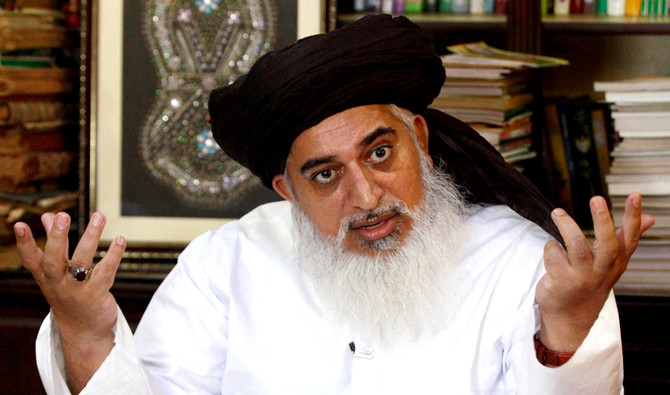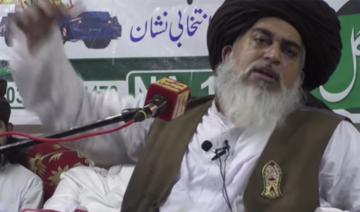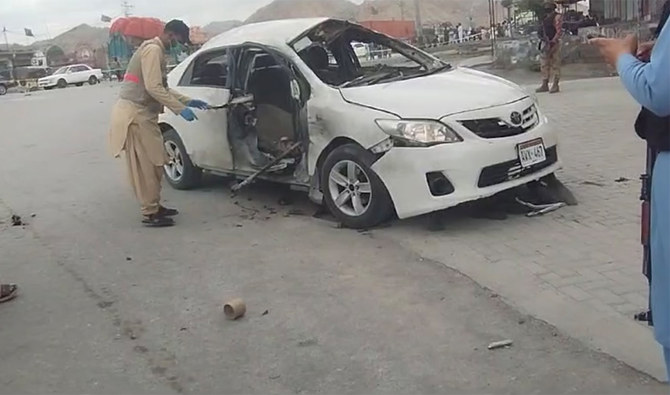ISLAMABAD: Khadim Hussain Rizvi, leader of the ultra-right Tehreek-e-Labbaik Pakistan (TLP), and his deputy Pir Afzal Qadri, could face life imprisonment if proven guilty of inciting violence against state institutions — the judiciary and the army — in the court of law.
The government has announced to book both of them under sedition and terrorism charges, while they are already in “protective custody” of the authorities since November 24.
“Sedition is a serious charge as it is considered a crime against the state,” Sharafat Ali, senior advocate, told Arab News.
“If proven guilty in the court of law, one can be punished with imprisonment for life to which fine may also be added,” he said, “the minimum punishment in this crime is three years imprisonment with or without a fine.”
Ali, however, said that it would all depend on the will of the state and state prosecutors as to how they plead the case in the court. “The quality of investigation and material evidence presented before the court will determine the will of the state in the case,” he said.
The fiery wheelchair-bound cleric Rizvi and his deputy Qadri, supported by hundreds of their followers, blocked highways and motorways in all major cities of the country after Supreme Court announced to acquit a Pakistani Christian woman, Asia Bibi, in a blasphemy case on October 30.
The duo along with thousands of violent protesters demanded reversal of the verdict. Pir Afzal Qadri, however, shocked many Pakistanis during the protests when he called for mutiny in the army and urged domestic help of Supreme Court judges to kill them for handing down the verdict.
No member of the TLP could be contacted for comments as their phone numbers are switched off.
The TLP, whose main focus is protecting Pakistan’s draconian blasphemy laws, was founded out of a movement supporting a bodyguard who assassinated Punjab provincial governor Salman Taseer for advocating for Bibi in 2011.
Pakistan’s major opposition parties except Pakistan People's Party (PPP) have distanced themselves from the government’s decision of filing sedition and terrorism charges against the TLP leadership.
Senator Mushahidullah Khan, leader of the Pakistan Muslim League-Nawaz (PML-N), said the government has not consulted his party before booking Rizvi and his deputy under treason charges.
“Rizvi and his associates were once considered close to the ruling party for their opposition to the PML-N and I think they (the government) are in a better position now to deal with them,” he told Arab News.
Khan said the government has made a “political statement” about registration of the cases, “let’s see as to how effectively they proceed against Rizvi and his associates.”
Religio-political parties like Jamat-e-Islami (JI) and Jamiat Ulema-e-Islam Fazal (JUI-F) have also refused to support the government’s decision.
Liaqat Baloch, secretary-general of the JI said that his party would never support filing of treason and terrorism charges against the TLP leadership as “they were protesting for a genuine cause.”
“We will urge the government to drop the charges (against Rizvi and Qadri) to restore peace and calm in the country,” he told Arab News.
JUI-F Senator Molvi Faiz Muhammad said that his party has already passed a unanimous resolution against registration of cases against the TLP leadership and their arrests. “The government should realize that blasphemy is a sensitive issue and whatever was said by the TLP leaders was after acquittal of Asia Bibi,” he told Arab News.
He said that his party would raise the issue on the floor of the Parliament as well and press the government to drop the charges against the TLP leaders.
The PPP, which is the major opposition party in both National Assembly and the Senate, has supported the registration of sedition and terrorism charges against the TLP leaders for inciting violence against the state institutions.
“The decision to file terrorism and treason charges against TLP leaders is laudable,” Farhatullah Babar, PPP senior leader, told Arab News. He, however, urged the government to clarify whether Khadim Rizvi and his associates are still in “protective custody” or formally arrested to face “terrorism and treason charges.”
The blasphemy is a deeply divided and emotive issue in Pakistan and the TLP entered the mainstream politics in September 2017 by contesting a by-poll in Lahore by exploiting the matter. The party secured over two million votes in July 25 polls and won two seats in Sindh Assembly by campaigning on the blasphemy issue.
“The TLP movement was just a bubble and it stands burst with the arrest of its central leadership. I think they have no political future at least for now,” Muhammad Amir Rana, director of Pak-Institute for Peace Studies (PIPS), told Arab News.

















